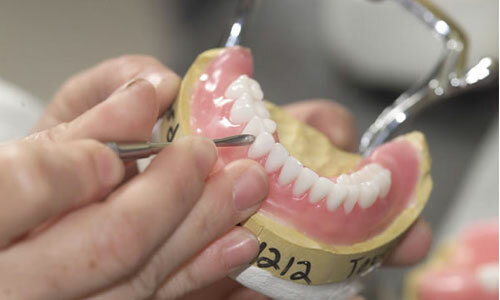Healthy teeth are not only a charming smile, but also a guarantee of health of the stomach and the whole digestive system. Poorly chewing food, we cause serious damage to these organs. Therefore, if the teeth are destroyed as a result of trauma or disease, it is better to insert dentures. In this article, we will try to figure out which dentures are better.

Healthy teeth are not only a charming smile, but also a guarantee of health of the stomach and the whole digestive system. Poorly chewing food, we cause serious damage to these organs. Therefore, if the teeth are destroyed as a result of trauma or disease, it is better to insert dentures. In this article, we will try to figure out which dentures are better.
Classification of dentures
Depending on the method of fixation, dentures can be divided into two groups:
Fixed dentures
The most commonly used are fixed structures:
- single or partial crowns;
- bridges;
- tabs;
- cast keel inserts on pins;
- lumineers and veneers.
Such prostheses are firmly fixed due to special cements, and the support for their installation is healthy teeth or residual dental tissues( including roots), which retained sufficient strength. Obviously, this type of dentures can not be used in case of destruction of several adjacent teeth, when the supporting elements are absent.

Crowns can be installed both for permanent wearing, and for a certain period( from 2 weeks to 8 months).If temporary dentures are made of plastic, then with their prolonged wearing, there is a risk of inflammation in the soft tissues adjacent to the crown. Therefore, temporary crowns, designed for long-term wearing, are recommended to be made of cermets or composite materials.
Removable dentures
Used for prosthetics of significant defects when the jaw is missing all teeth or most of them. In some exceptional cases, such a prosthesis can be shown and with small defects. This group combines three types of prosthetics:
1. Complete removable prosthetics.
Performed in cases where the jaw is completely devoid of teeth. A complete removable denture is retained only if the base is completely adhered to the prosthetic bed. Quite often it is possible to achieve a good fixation of the prosthesis on the upper jaw, provided that the basal boundaries are correctly selected. This is due to the formation of a closing valve, which creates some rarefaction between the basis of the prosthesis and the prosthetic bed. Unfortunately, the specificity of the lower jaw does not allow also to fix the lower denture well, its wearing is always associated with some inconveniences. Several improve the situation with adhesive creams and pastes;
2. Partial removable prosthetics.
Assigned in the presence of end and long included defects of the dentition. Partial removable dentures are installed using healthy teeth as a support.
This prosthetics has several disadvantages:
- The supporting teeth must be grinded, which eventually leads to their faster wear;
- In addition to the usual load, the supporting teeth perceive a partial load from the prosthesis, which also has a detrimental effect on their condition over time;
- Since the main burden of the prosthesis is on the gums, the jawbone begins to atrophy. This process is constantly developing, because of which neighboring teeth can break down after a while.
3. Conditionally removable dentures: types of prosthetics, in which the prosthesis is removed with a certain periodicity for hygienic treatment of the oral cavity.

What are dentures - types
The first question that is asked by a person who wants to install removable dentures: what better to put and how to get a decent quality at the lowest price? The best dentures are made of ceramics or composite materials. The use of the latter even allows you to grow a new tooth provided that the real tooth has not been completely destroyed. But the cost of such prosthetics can not be called affordable for the majority of those in need. Fortunately, modern dentistry can offer and not such "sky-high" options.
Prostheses made of plastic
In dental prosthetics this material has been used for a long time, therefore its properties and influence on the organism have been fully studied. Along with such an important advantage as an acceptable price, plastic has the following drawbacks:
- With prolonged wearing, the plastic prosthesis can change color, being exposed to food dyes;
- Plastic prosthesis requires very thorough hygienic care, as dental plastics can serve as a medium for the development of bacteria.
Nylon Prostheses
If you have not decided which dentures will be better placed, we recommend you pay attention to this material. Nylon in dentistry has been used relatively recently, but it quickly gained a well-deserved popularity. Nylon dentures have such advantages:
- A soft elastic base providing the best contact with soft tissues of the jaw;
- Good strength and resistance to mechanical stress;
- Durability;
- Nylon prosthesis very naturally looks in the oral cavity, its basis is transparent and does not stand out on the gum.

Clasp prosthesis
Clasp prosthesis is a kind of partially removable denture, which is very common in dentistry. They are made using a cast frame, the basis is usually made of acrylic. These dentures are better and cheaper to install when there are still healthy teeth in the oral cavity, which will perform the function of supporting teeth.
Dental implants
This advanced technology of prosthetics will allow you to forget about problems with teeth forever. Functionally, the implant is the artificial root of the tooth on which the prosthesis is mounted. Such a tooth not only looks like the real one, but it is felt like that. Sometimes a patient generally forgets what kind of tooth is "native" to him, and what is implanted. Unlike prosthetic bridges, prosthetics on implants:
- It does not require the undermining of healthy teeth for their use as a support;
- Like a real tooth, it transfers the load from chewing to the jawbone( with bridge prostheses the bone of the jaw does not perceive the load and eventually becomes atrophied, which leads to the destruction of the remaining teeth);
- Does not increase the load on the remaining teeth.
In the matter of choosing the material and the type of denture, the financial role of the patient, of course, plays the main role. Unfortunately, ceramic, composite dentures, as well as crowns and dentures made of precious metals and their alloys, are still very expensive and not everyone can afford. But excessive savings in this case will be inappropriate, since the state of the oral cavity directly affects the state of the whole organism.
In any case, you should know that buying expensive dentures, you do not risk overpaying for an advertised brand or author's design, the high price is due only to the quality and practicality of the product. Be healthy and smile more often!



